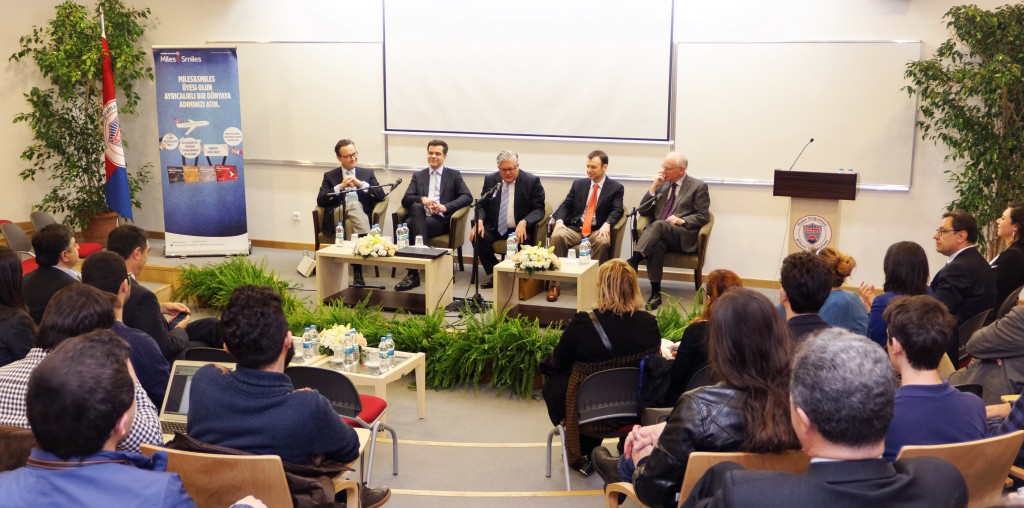Bilkent University hosted a panel discussion to mark the centenary of one of the most important events to take place in the Middle East during World War I: the Ottoman victory over the British at the Siege of Kut’ül-Amare (known in English as Kut-al-Amara).
 Titled “Remembering Kut’ül-Amare: 100 Years Later,” the panel was held in the UNAM Conference Hall and featured speakers who are experts on World War I and military history: Sir Hew Strachan of the University of St. Andrews at Oxford; Prof. Michael A. Reynolds of Princeton University; Prof. Robert Gerwarth of University College Dublin; and Prof. Alexander Krethlow of Bern University. Altay Cengizer, director general of policy planning at the Ministry of Foreign Affairs, moderated the panel.
Titled “Remembering Kut’ül-Amare: 100 Years Later,” the panel was held in the UNAM Conference Hall and featured speakers who are experts on World War I and military history: Sir Hew Strachan of the University of St. Andrews at Oxford; Prof. Michael A. Reynolds of Princeton University; Prof. Robert Gerwarth of University College Dublin; and Prof. Alexander Krethlow of Bern University. Altay Cengizer, director general of policy planning at the Ministry of Foreign Affairs, moderated the panel.
The proceedings opened with introductory remarks by Rector Abdullah Atalar, following which the floor was given to the guest panelists. Prof. Strachan, the first to speak, discussed British interests in the Middle East and in particular Baghdad during World War I. He argued that these interests lay not only in securing the route to India, but also in having access to the resources—mainly oil—to be found in Baghdad province. In that sense, the British defeat at Kut’ül-Amare in 1916—following the huge defeat at Gallipoli in 1915—had an important impact on the British war effort.
The next presentation, by Prof. Reynolds, focused on the reasons for the decision by the Committee of Union and Progress (CUP) to enter World War I. He contended that insofar as the CUP entered the war in order to save the Ottoman Empire from collapsing, this was a rational decision. Prof. Reynolds noted that according to David Lloyd George, British prime minister during the period, the Ottoman entrance into the conflict extended the war at least by two years. This presentation made an interesting point by suggesting that looking at what did not happen in history is sometimes as important as looking at what did happen, with the Russian withdrawal from the war in 1917 given as a prime example.
The two remaining speakers discussed aspects of the military collaboration between the Ottomans and the Germans. Prof. Gerwarth, an expert on German modern and military history, looked at the development of the alliance between the two powers. Prior to the war, the Ottoman Empire was seen as a weak ally that was not the best option for the Western powers. Nonetheless, he argued, an alliance between Germany and the Ottoman Empire was in fact a very rational choice for the Germans. Prof. Gerwarth also contended that the nature of the violence changed after 1918, by which time millions of soldiers had been fighting on the various fronts of the war for many years.
The final presentation focused more specifically on German–Ottoman collaboration during the Siege of Kut. Prof. Krethlow is the author of a biography of von der Goltz Pasha, who had a long association with the Ottoman army as a military advisor and served as a commander during World War I. Discussing the German general’s role during the siege of Kut, Prof. Krethlow stressed the value for the Ottomans of having such a determined and decisive commander on such an important front. Von der Goltz, he said, unlike many other high-ranking officials in the Ottoman military, did not spend his time at headquarters but rather on the front with his soldiers. Although von der Goltz was 72 years old during the siege and died of typhus 10 days before the victory, his motivation and decisiveness were, according to Prof. Krethlow, an important factor in the Kut victory.
The formal portion of the panel concluded with remarks by the moderator. Mr. Cengizer stressed the continuing importance of the Kut victory for the Republic of Turkey, which until 1952—when Turkey became a member of NATO—was celebrated in this country. He also expressed his view that remembering such important historical events should be done in such a way that no one gets insulted—in other words, in a scholarly way. On a related note, Mr. Cengizer announced that a limited edition of new postage stamps will be printed by the PTT to commemorate the victory at Kut’ül-Amare.
Following Mr. Cengizer’s remarks, a question and answer session provided a forum for further discussion on this crucial event in the history of both the Ottoman Empire and World War I.
* Arda Akıncı, Master’s Student at the History Department